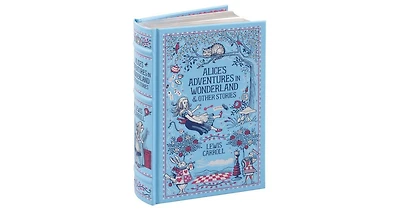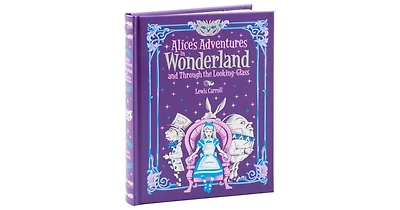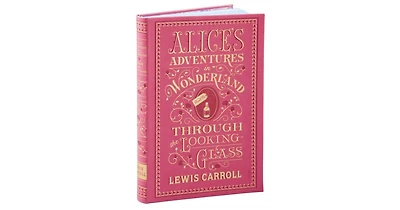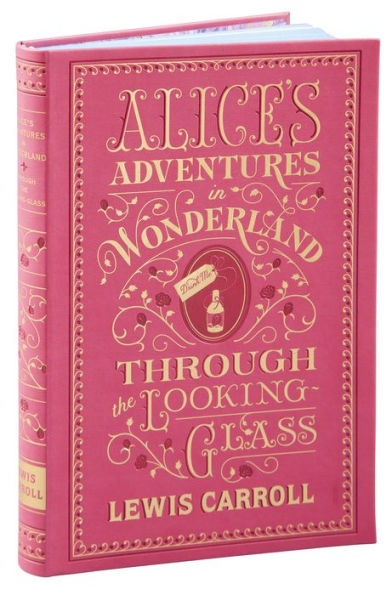Home
Alice's Adventures in Wonderland: An edition printed in the International Phonetic Alphabet
Barnes and Noble
Loading Inventory...
Alice's Adventures in Wonderland: An edition printed in the International Phonetic Alphabet in Franklin, TN
Current price: $15.95

Barnes and Noble
Alice's Adventures in Wonderland: An edition printed in the International Phonetic Alphabet in Franklin, TN
Current price: $15.95
Loading Inventory...
Size: OS
The International Phonetic Alphabet is a system of phonetic notation based primarily on the Latin alphabet. It was devised by the International Phonetic Association as a standardized representation of the sounds of spoken language. The IPA is used by lexicographers, foreign language students and teachers, linguists, speech-language pathologists, singers, actors, constructed language creators, and translators. This edition of "Alice's Adventures in Wonderland" is written entirely in that same alphabet, with fonts specially designed by Michael Everson. The transcription reflects the standard, regionally-neutral form of spoken British English known as "Received Pronunciation". Granted that most linguists agree that not much more than 4% of the population of Britain speak it today, RP was nevertheless traditionally based on educated speech in southern England; it is still widely taught and dictionaries for native speakers and learners of English still make use of it in their transcriptions. Because this is a novel, and meant to be read, it was decided to retain some orthographic features which are not normally kept in phonetic transcription: punctuation, italicization, and capitaliza-tion. Carroll's punctuation has been retained with the exception of the apostrophe marking the genitive (because "Duchess's voice" just looked wrong as "ˈDʌtʃɪs'ɪz vɔɪs"). ---- Ðiː ˌꞮntəˈnæʃənl Fəʊˈnetɪk ˈÆlfəbɪt ɪz ə ˈsɪstɪm ɒv fəʊˈnetɪk nəʊˈteɪʃən beɪst ˈpraɪmərɪlɪ ɒn ðə ˈLætɪn ˈælfəbɪt. Ɪt wɒz dɪˈvaɪzd baɪ ðiː ˌꞮntəˈnæʃənl Fəʊˈnetɪk Əˌsəʊsɪˈeɪʃən æz ə ˈstændədaɪzd ˌreprɪzenˈteɪʃən ɒv ðə saʊndz ɒv ˈspəʊkən ˈlæŋɡwɪdʒ. Ðə ˈAɪ ˈPiː ˈEɪ ɪz juːzd baɪ ˌleksɪˈkɒɡrəfəz, ˈfɒrɪn ˈlæŋɡwɪdʒ ˈstjuːdənts, ənd ˈtiːtʃəz, ˈlɪŋɡwɪsts, spiːtʃ ǝn ˈlæŋɡwɪdʒ pəˈθɒlədʒɪsts, ˈsɪŋəz, ˈæktəz, kənˈstrʌktɪd ˈlæŋɡwɪdʒ kriːˈeɪtəz, ənd trænsˈleɪtəz. Ðɪs ɪˈdɪʃən əv "ˈÆlɪsɪz Ədˈventʃəz ɪn ˈWʌndəˌlænd" prɪˈzents ðə tekst ɪn ən ˌꞮntəˈnæʃənl Fəʊˈnetɪk ˈÆlfəbɪt trænsˈkrɪpʃən. Ðə træns-ˈkrɪpʃən rɪˈflekts ðə ˈstændəd ˈriːdʒənli ˈnjuːtrəl fɔːm əv ˈspəʊkən ˈBrɪtɪʃ ˈꞮŋɡlɪʃ nəʊn æz "Rɪˈsiːvd Prəˌnʌnsɪˈeɪʃən". Ɡrɑːntɪd ðæt məʊst ˈlɪŋɡwɪsts əˈɡriː ðæt nɒt mʌtʃ mɔː ðæn 4% əv ðə ˌpɒpjʊˈleɪʃən əv ˈBrɪtən spiːk ɪt təˈdeɪ, ˈⱭː ˈPiː wɒz ˌnevəðəˈles trəˈdɪʃnəlɪ beɪst ɒn ˈedjuːkeɪtɪd spiːtʃ ɪn ˈsʌðən ˈꞮŋɡlənd; ɪt ɪz stɪl ˈwaɪdli tɔːt ənd ˈdɪkʃənrɪz fə ˈneɪtɪv ˈspiːkəz ənd ˈlɜːnəz əv ˈɪŋɡlɪʃ stɪl meɪk juːs əv ɪt ɪn ðeə trænsˈkrɪpʃənz. Bɪˈkɒz ðɪs ɪz ə ˈnɒvəl, ənd ment tə biː red, ɪt wɒz dɪˈsaɪdɪd tə rɪˈteɪn sʌm ˌɔːθəˈɡræfɪk ˈfiːtʃəz wɪtʃ ɑː nɒt ˈnɔːməli kept ɪn fəʊˈnetɪk trænsˈkrɪpʃən: ˌpʌŋktjʊˈeɪʃən, ɪˈtælɪsaɪˈzeɪʃən, ənd kəˌpɪtəlaɪˈzeɪʃən. ˈKærəlz ˌpʌŋktjʊˈeɪʃən hæz beːn rɪˈteɪnd wɪð ðiː ɪkˈsepʃən əv ðiː əˈpɒstrəfɪ ˈmɑːkɪŋ ðə ˈdʒenɪtɪv (bɪˈkɒz "Duchess's voice" dʒʌst lʊkt rɒŋ æz "ˈDʌtʃɪs'ɪz vɔɪs").
The International Phonetic Alphabet is a system of phonetic notation based primarily on the Latin alphabet. It was devised by the International Phonetic Association as a standardized representation of the sounds of spoken language. The IPA is used by lexicographers, foreign language students and teachers, linguists, speech-language pathologists, singers, actors, constructed language creators, and translators. This edition of "Alice's Adventures in Wonderland" is written entirely in that same alphabet, with fonts specially designed by Michael Everson. The transcription reflects the standard, regionally-neutral form of spoken British English known as "Received Pronunciation". Granted that most linguists agree that not much more than 4% of the population of Britain speak it today, RP was nevertheless traditionally based on educated speech in southern England; it is still widely taught and dictionaries for native speakers and learners of English still make use of it in their transcriptions. Because this is a novel, and meant to be read, it was decided to retain some orthographic features which are not normally kept in phonetic transcription: punctuation, italicization, and capitaliza-tion. Carroll's punctuation has been retained with the exception of the apostrophe marking the genitive (because "Duchess's voice" just looked wrong as "ˈDʌtʃɪs'ɪz vɔɪs"). ---- Ðiː ˌꞮntəˈnæʃənl Fəʊˈnetɪk ˈÆlfəbɪt ɪz ə ˈsɪstɪm ɒv fəʊˈnetɪk nəʊˈteɪʃən beɪst ˈpraɪmərɪlɪ ɒn ðə ˈLætɪn ˈælfəbɪt. Ɪt wɒz dɪˈvaɪzd baɪ ðiː ˌꞮntəˈnæʃənl Fəʊˈnetɪk Əˌsəʊsɪˈeɪʃən æz ə ˈstændədaɪzd ˌreprɪzenˈteɪʃən ɒv ðə saʊndz ɒv ˈspəʊkən ˈlæŋɡwɪdʒ. Ðə ˈAɪ ˈPiː ˈEɪ ɪz juːzd baɪ ˌleksɪˈkɒɡrəfəz, ˈfɒrɪn ˈlæŋɡwɪdʒ ˈstjuːdənts, ənd ˈtiːtʃəz, ˈlɪŋɡwɪsts, spiːtʃ ǝn ˈlæŋɡwɪdʒ pəˈθɒlədʒɪsts, ˈsɪŋəz, ˈæktəz, kənˈstrʌktɪd ˈlæŋɡwɪdʒ kriːˈeɪtəz, ənd trænsˈleɪtəz. Ðɪs ɪˈdɪʃən əv "ˈÆlɪsɪz Ədˈventʃəz ɪn ˈWʌndəˌlænd" prɪˈzents ðə tekst ɪn ən ˌꞮntəˈnæʃənl Fəʊˈnetɪk ˈÆlfəbɪt trænsˈkrɪpʃən. Ðə træns-ˈkrɪpʃən rɪˈflekts ðə ˈstændəd ˈriːdʒənli ˈnjuːtrəl fɔːm əv ˈspəʊkən ˈBrɪtɪʃ ˈꞮŋɡlɪʃ nəʊn æz "Rɪˈsiːvd Prəˌnʌnsɪˈeɪʃən". Ɡrɑːntɪd ðæt məʊst ˈlɪŋɡwɪsts əˈɡriː ðæt nɒt mʌtʃ mɔː ðæn 4% əv ðə ˌpɒpjʊˈleɪʃən əv ˈBrɪtən spiːk ɪt təˈdeɪ, ˈⱭː ˈPiː wɒz ˌnevəðəˈles trəˈdɪʃnəlɪ beɪst ɒn ˈedjuːkeɪtɪd spiːtʃ ɪn ˈsʌðən ˈꞮŋɡlənd; ɪt ɪz stɪl ˈwaɪdli tɔːt ənd ˈdɪkʃənrɪz fə ˈneɪtɪv ˈspiːkəz ənd ˈlɜːnəz əv ˈɪŋɡlɪʃ stɪl meɪk juːs əv ɪt ɪn ðeə trænsˈkrɪpʃənz. Bɪˈkɒz ðɪs ɪz ə ˈnɒvəl, ənd ment tə biː red, ɪt wɒz dɪˈsaɪdɪd tə rɪˈteɪn sʌm ˌɔːθəˈɡræfɪk ˈfiːtʃəz wɪtʃ ɑː nɒt ˈnɔːməli kept ɪn fəʊˈnetɪk trænsˈkrɪpʃən: ˌpʌŋktjʊˈeɪʃən, ɪˈtælɪsaɪˈzeɪʃən, ənd kəˌpɪtəlaɪˈzeɪʃən. ˈKærəlz ˌpʌŋktjʊˈeɪʃən hæz beːn rɪˈteɪnd wɪð ðiː ɪkˈsepʃən əv ðiː əˈpɒstrəfɪ ˈmɑːkɪŋ ðə ˈdʒenɪtɪv (bɪˈkɒz "Duchess's voice" dʒʌst lʊkt rɒŋ æz "ˈDʌtʃɪs'ɪz vɔɪs").

















